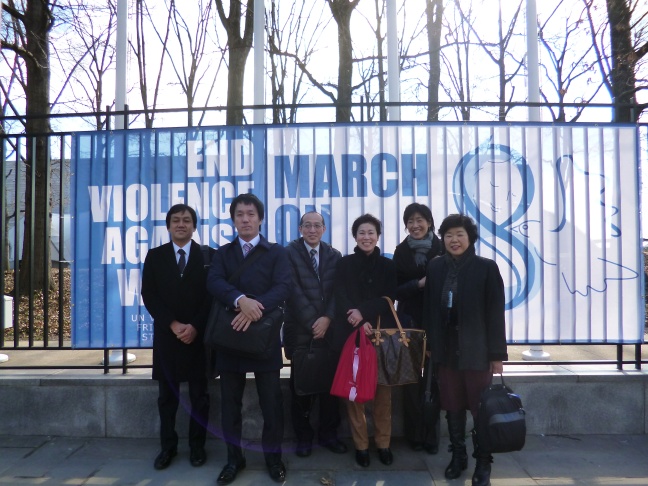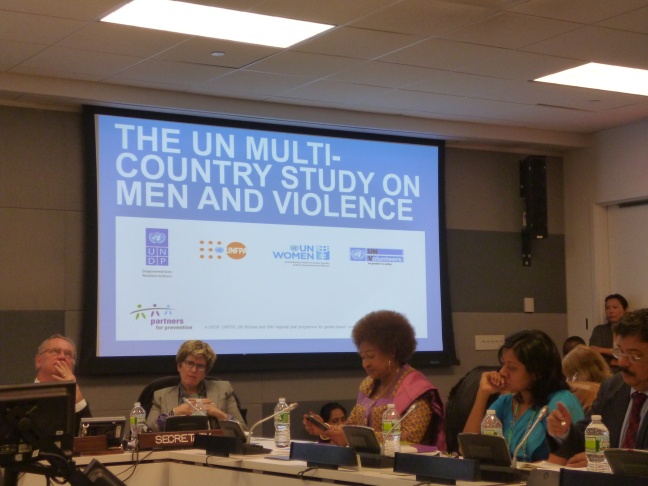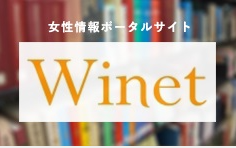International Conference/International Exchange
- HOME
- International Cooperation
- International Conference/International Exchange
- The 57th Session of the United Nations Commission on the Status of Women
International Conference/International Exchange
- CSW
-
The 57th Session of the United Nations Commission on the Status of Women
Date:March 4 to15, 2013
Place:United Nations Headquarters (New York) /
From Monday, March 4 to Friday, March 15, 2013, the 57th session of the Commission on the Status of Women (hereinafter "CSW") was held at the United Nations Headquarters (New York). Two members of staff from NWEC - from the Office of Research and International Affairs and from the Information Division – participated as members of the Japanese government delegation (headed by Ms. Hiroko Hashimoto).
 The Japanese government delegation
The Japanese government delegation
With the priority theme set as "Elimination and prevention of all forms of violence against women and girls," a series of statements were made by representatives of participating states and associated UN entities as well as by representatives of NGOs, and high-level round tables and interactive expert panels were also held. Other proceedings included deliberations by a review panel about progress in the actions by respective nations and international organizations to implement the agreed conclusions adopted at CSW53 - the "equal sharing of responsibilities between women and men, including caregiving in the context of HIV/AIDS" - as well as a preparatory panel organized on the subject of " Key gender equality issues to be reflected in the post-2015 development framework" which is slated to be the priority theme of CSW58. During the panels, gaps between associated laws and the reality of assistance to victims of violence were discussed, along with the establishment of a cross-sectoral structure offering comprehensive services, both as areas of importance in an attempt to stamp out violence against women. In connection with the post-2015 Millennium Development Goals, participants actively engaged in talks about the need to develop new evaluation indicators, including qualitative evaluation, and, as one of the emerging issues, repercussions of climate change on gender relationships.
 Ms. Hiroko Hashimoto, the representative of the Japanese government
Ms. Hiroko Hashimoto, the representative of the Japanese government
Ms. Hashimoto, representing Japan, made a statement on behalf of the Japanese government on March 7, in which emphasis was placed on a wide range of actions being taken in Japan, in accordance with the Third Basic Plan for Gender Equality and the Act on the Prevention of Spousal Violence and the Protection of Victims, in order to eliminate violence against women and girls. Ms. Hashimoto cited some initiatives on the domestic front as good practices, including the Campaign for Eliminating Violence against Women (November 12 through 25, 2012), an increase in the number of female police officers in order to protect women victimized by violence, and steps taken to clarify victim assistance mechanisms. The project against trafficking in persons in the Mekong region, for which NWEC has been entrusted to provide training in Japan by JICA, was mentioned in the statement as a good example of victim assistance as well.
On March 8, an International Women's Day event was held at the United Nations Headquarters in the presence of United Nations Secretary-General Ban Ki-moon, at which UN Women Executive Director Michelle Bachelet remarked that "eliminating violence against women was one of the issues of top priority set when UN Women was established two years ago, and change is possible, and change is happening." This event also served as the occasion for the launch of UN Women's theme song, "One Woman."
 International Women's Day
International Women's Day
Over the course of the CSW, a variety of side events and parallel events also took place, in which a variety of efforts toward the "Elimination and prevention of all forms of violence against women and girls" were showcased.
In a side event entitled "Guidelines to measure violence against women," a report was delivered on the guidelines that are currently being developed by the United Nations Statistics Division for research on the reality of violence against women, together with a presentation of case examples of research on the state of affairs in the Pacific region. It was made clear that fact-finding about violence against women is an extremely sensitive task and attention must therefore be paid when setting question items, and that it is also important to provide care to questioners. The final version of the guidelines being developed by the United Nations Statistics Division is scheduled to come out around May.
 Latest research results conducted by UN agencies were reported in side events
Latest research results conducted by UN agencies were reported in side events
By attending a series of these events, NWEC actively engaged in collecting material prepared by participating nations and NGOs, in which the state of women in the respective regions is put together. The collected material will be organized and recorded, and will then be made available in the collection of the Information Center for Women's Education.
 Representatives of participating states hailing the adoption of the agreed conclusions
Representatives of participating states hailing the adoption of the agreed conclusions
 UN Women Executive Director Bachelet making a brief speech after the adoption of the agreed conclusions
UN Women Executive Director Bachelet making a brief speech after the adoption of the agreed conclusions
Given the first-ever failure in the history of the CSW to reach any agreed conclusions last year, discussions were held every day until late into the night in an attempt to hammer out an agreement. On the last day, as NGOs watched anxiously from the hallway, worrying about the lagging progress, the discussions went on. Even when evening fell, no conclusion had yet been reached, generating a feeling that it would be difficult to reach an agreement by the end of the day; however, thanks to the strong leadership of the chairperson and the efforts by the representatives of the respective nations, the adoption of agreed conclusions was achieved successfully before 8:00 p.m.
Information and videos regarding the details and the agreed conclusions of CSW57 are posted on UN Women's website below (postings are in the official languages of the United Nations, including English)
International Cooperation
- International Seminar
- FY2019 Seminar for Gender Equality Officers and Women Leaders in the Asia Region
- FY2018 Seminar for Gender Equality Officers and Women Leaders in the Asia Region
- FY2017 Seminar for Gender Equality Officers and Women Leaders in the Asia Region
- FY2016 Seminar for Gender Equality Officers and Women Leaders in the Asia Region
- FY2015 Seminar for Gender Equality Officers and Women Leaders in the Asia Pacific Region
- FY2014 Seminar for Gender Equality Officers and Women Leaders in the Asia Pacific Region
- FY2013 Seminar for Gender Equality Officers and Women Leaders in the Asia Pacific Region
- FY2012 Seminar for Gender Equality Officers and Women Leaders in the Asia Pacific Region
- FY2011 Seminar for Gender Equality Officer and Women Leaders in the Asia Pacific Region
- FY2010 Empowerment Seminar for Women Leaders in the Asia Pacific Region
- FY2009 Empowerment Seminar for Women Leaders in the Asia Pacific Region Final Report
- FY2008 Empowerment Seminar for Women Leaders in the Asia Pacific Region
- FY2007 Empowerment Seminar for Women Leaders in the Asia Pacific Region
- FY2006 Empowerment Seminar for Women Leaders in the Asia Pacific Region
- NWEC Global Seminar
- FY2025 NWEC Global Seminar: Addressing Technology-Facilitated Gender Based Violence (TFGBV): Approaches to Eradicate the Invisible Harm
- FY2024 NWEC Global Seminar: Gender Equality and Care
- FY2023 NWEC Global Seminar: Gender Mainstreaming & Strengthening Institutional Mechanism with Gender Perspective
- FY2022 NWEC Global Seminar: Does Digital Technology Advance Gender Equality?
- FY2021 NWEC Global Seminar: Combating Gender-Based Violence – “Building Back Better” from the Covid-19 Crisis
- FY2020 NWEC Global Seminar: Covid-19 and Gender
- FY2019 NWEC Global Seminar: Gender and Media
- FY2018 NWEC Global Seminar: Promotion of the Advancement of Women - What Japan can learn from Iceland about Gender Equality?
- FY2017 NWEC Global Seminar: Promotion for Advancement of Women Lessons from Germany
- FY2016 NWEC Global Seminar: Promotion for Advancement of Women –Lessons from Europe
- FY2015 International Symposium: Gender Equality and Women's Empowerment
- FY2014 International Symposium: Keys to Diversity and Women's Leadership
- FY2013 NWEC International Symposium:Gender Equality for Men
- FY2012 NWEC International Symposium:To Make a Society without Violence against Women a Reality
- FY2011 NWEC International Symposium
- FY2010 International Forum for Women's Empowerment
- FY2009 International Forum for Women's Empowerment
- FY2008 International Forum for Women's Empowerment Final Report3
- FY2008 International Forum for Women's Empowerment Final Report2
- FY2008 International Forum for Women's Empowerment Final Report1
- Cooperation with JICA
- FY2025 Knowledge Co-Creation Program (KCCP): "Promotion of Global Networking on Anti-Trafficking in Persons"
- FY2025 Knowledge Co-Creation Program "Eradicating Sexual and Gender-Based Violence (SGBV)"
- FY2025 Knowledge Co-Creation Program: Bangladesh “Strengthening Capacity to Address Gender-Based Violence"
- FY2024 Knowledge Co-Creation Program on "Promotion of Global Networking on Anti-Trafficking in Persons"
- FY2024 Knowledge Co-Creation Program "Eradicating Sexual and Gender-Based Violence (SGBV)"
- FY2023 Knowledge Co-creation Program "Promotion of Networking among ASEAN Countries on Anti-Trafficking in Persons”
- FY2023 Knowledge Co-Creation Program "Eradicating Sexual and Gender-Based Violence (SGBV)"
- FY2022 Knowledge Co-creation Program "Promotion of Networking among ASEAN Countries on Anti-Trafficking in Persons”
- FY2022 Knowledge Co-Creation Program "Eradicating Sexual and Gender-Based Violence (SGBV)"
- FY2021 Knowledge Co-creation Program "Promotion of Networking among ASEAN Countries on Anti-Trafficking in Persons”
- FY2020 Knowledge Co-creation Program "Promotion of Networking among ASEAN Countries on Anti-Trafficking in Persons”
- FY2019 Knowledge Co-creation Program "Promotion of Networking among ASEAN Countries on Anti-Trafficking in Persons”
- FY2018 Knowledge Co-creation Program "Promotion of Networking among ASEAN Countries on Anti-Trafficking in Persons”
- Issue-specific Training “Seminar on Promotiom of Networking among ASEAN Countries on Anti-Trafficking in Persons”
- Basic Information-Gathering Survey/Workshop Seminar on the Economic Independence for Women in Central America and the Caribbean (El Salvador/Dominican Republic)
- Regional Gender Seminar in Central and South America
- 2015 Issue-specific Training "Seminar on Promotion of Networking among Asian Countries on Anti-Trafficking in Persons"
- Seminar on the Promotion of Education for Girls and Women II
- International Conference/International Exchange
- Visit by Professor Hilado from the University of the Philippines Visayas
- Online meeting with Seisen International School elementary students
- Visitor: Mansfield Fellows
- Visitor:JICA Knowledge Co-Creation Program (KCCP) on "Women's Empowerment through Business for Central American Integration System (SICA) Member Countries"
- The 68th Session of the Commission on the Status of Women
- Visitor: Madam Sustjie Mbumba, First Lady of the Republic of Namibia
- Workshop of commemorating the donation of the Beate Shirota Gordon archive materials
- Meeting with Korean Women’s Development Institute (KWDI)
- The Coalition of Finnish Women's Associations (NYTKIS) Secretary General Ms. KAKKOLA’s Courtesy Call to Foreign Minister KAMIKAWA
- The Coalition of Finnish Women's Associations (NYTKIS) Secretary General Ms. KAKKOLA’s Japan Visit Program
- The 67th Session of the Commission on the Status of Women
- NGO CSW67 Forum
- Webinar with Korean Women’s Development Institute (KWDI)
- The 66th Session of the Commission on the Status of Women (Hybrid format)
- Online meeting with international graduate students from the Appropriate Technology course at the University of Tsukuba
- The 65th session of the Commission on the Status of Women
- Lecture "The Beate Sirota Gordon Archives at Mills College"
- Participation in 2nd AGenT
- The 64th session of the Commission on the Status of Women
- Dr. Wang from National Taiwan University visits NWEC
- Japan Network of Women Engineers and Scientists and The Japan Inter-Society Liaison Association Committee for Promoting Equal Participation of Men and Women in Science and Engineering: 9th Japan Korea China Women Leaders Forum for Science & Technology
- Researcher from the KWDI visits NWEC
- Visit by a delegation from the Socialist Republic of Vietnam Ministry of National Defense
- Briefing on the Reykjavik Index for Leadership
- Women's Archives Center Exhibition "Beate Sirota Gordon and gender equality in Japanese Constitution"
- Visit from the Guangxi Women’s Federation
- Participation in the 63rd Session of the Commission on the Status of Women
- 7th Global Forum on Gender Statistics
- FY2018 International Symposium hosted by Korean Institute for Gender Equality Promotion and Education “Gender Equality at Schools”
- Visit from All-China Women’s Federation(ACWF)
- Participation in the 62nd Session of the Commission on the Status of Women
- The 14th KIGEPE International Symposium “Empowering Women’s Leadership: expanding influence and innovation”
- Participation in the 61st Session of the Commission on the Status of Women
- Visit from the Batis Center for Women
- 2011 Asia Women Eco-Science Forum (a forum of science and engineering leaders in Japan, China and Korea)
- The 60th Session of the Commission on the Status of Women
- The 59th Session of the United Nations Commission on the Status of Women
- The 58th Commission on the Status of Women
- The 57th Session of the United Nations Commission on the Status of Women
- International Symposium: Gender Awareness Education for Sustainable Development
- Thirtieth Anniversary Programs
- Attendance at the Ceremony Commemorating the 25th Anniversary of the Korean Women’s Development Institute (KWDI)
- Japanese-Filipino children (JFC)* from the Philippines-based NGO “DAWN” visit the Center
- Visitors from Abroad to NWEC
- Research report on Multicultural Family Support in South Korea
- Workshop on Gender and Education: Life-long Learning for Women’s Empowerment
- Lecture Delivered by a Visiting Researcher
- Connections: Bringing Together the Next Generation of Women Leaders in Science, Technology, Engineering and Mathematics
- Conclusion of Memorandum of Understanding on Exchange and Cooperation with the Ministry of Women's Affairs, Royal Government of Cambodia
- Visit to Japan by the Minister of Women’s Affairs of the Royal Government of Cambodia
- KIGEPE Delegation Visit
- Officials of Ministry of Information and Communications of the Socialist Republic of Vietnam visited NWEC
- The 56th Commission on the Status of Women
- Dr. Barker's visit
- Multidisciplinary Intellectual Exchange for Women Leaders from the United States, Japan, South Korea and the Philippines
- Courtesy visit to University of Hawai`i
- Delegation of Board for the Advancement of Women, Ministry of Finance of the Socialist Republic of Vietnam visited NWEC
- Visit Korean Women's Development Institute (KWDI)
- Report on Participation in the 5th World Social Forum on Migration
- A group led by the Vice President of the Korean Women's Development Institute visited NWEC
- A disaster management specialist from India visits the Center
- Visit to the Korean Institute for Gender Equality Promotion & Education (KIGEPE) and others
- Secretary of State, Ministry of Justice, Kingdom of Cambodia visited NWEC
- Research conducted in the Republic of the Philippines
- Research on the Comparative Study of the Gender Equality Policy in Southeast Asian Countries in the Kingdom of Cambodia
- Ochanomizu University and A Canadian Women’s Study Researcher visited NWEC
- Aigyung Yang, Research Fellow and Former Director of Strategy Board for Women Friendly Policies of the Korean Women's Development Institute (KWDI) Visits NWEC
- Delegation of the Ministry of Defense of the Socialist Republic of Vietnam visited NWEC
- Delegation from the Women and Development Center, of the Vietnam Women's Union, Visited NWEC
- The "7th Asia-Pacific Forum on Development and Gender" was held in Seoul, South Korea
- HOME
- International Cooperation
- International Conference/International Exchange
- International Conference/International Exchange
- The 57th Session of the United Nations Commission on the Status of Women


